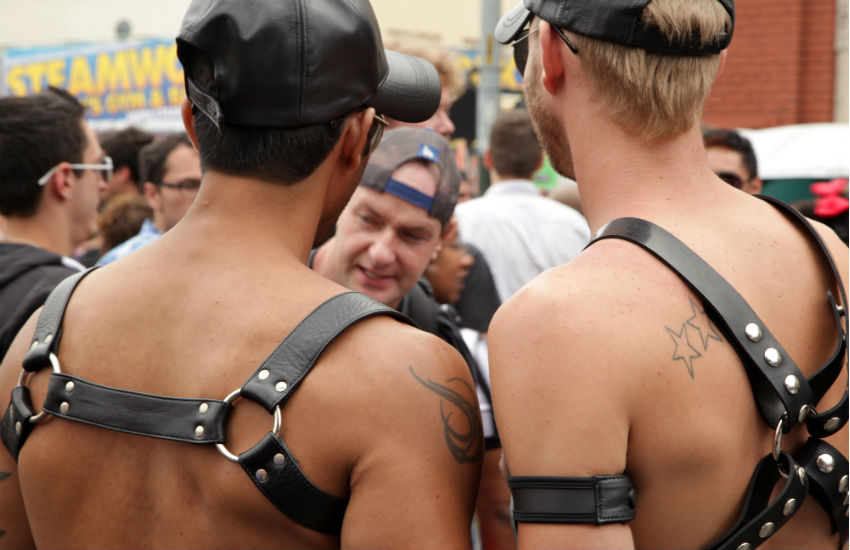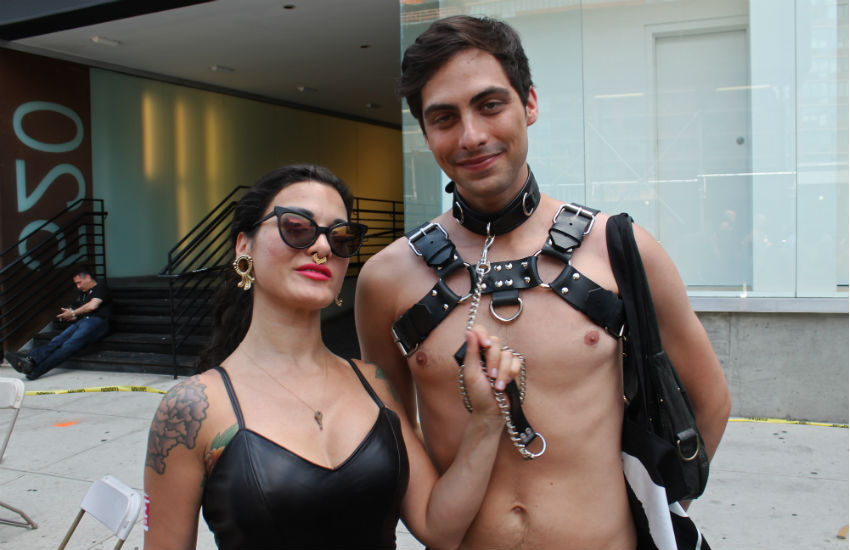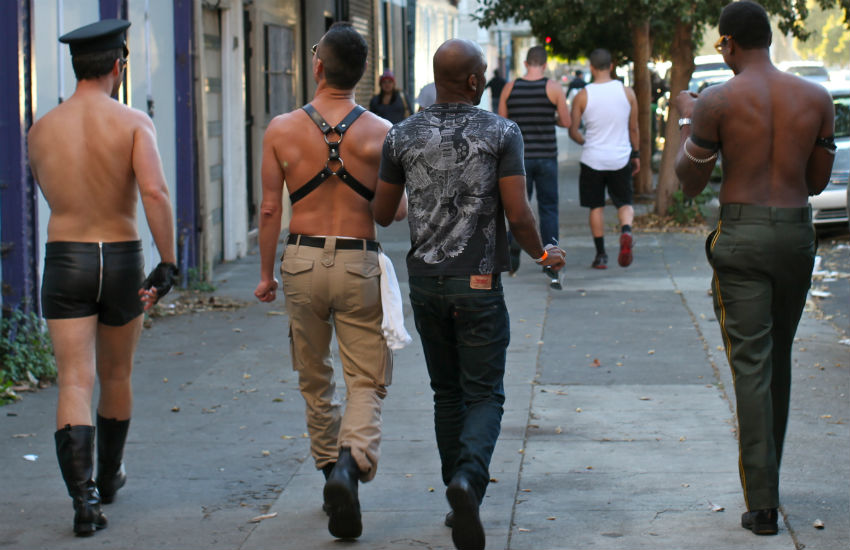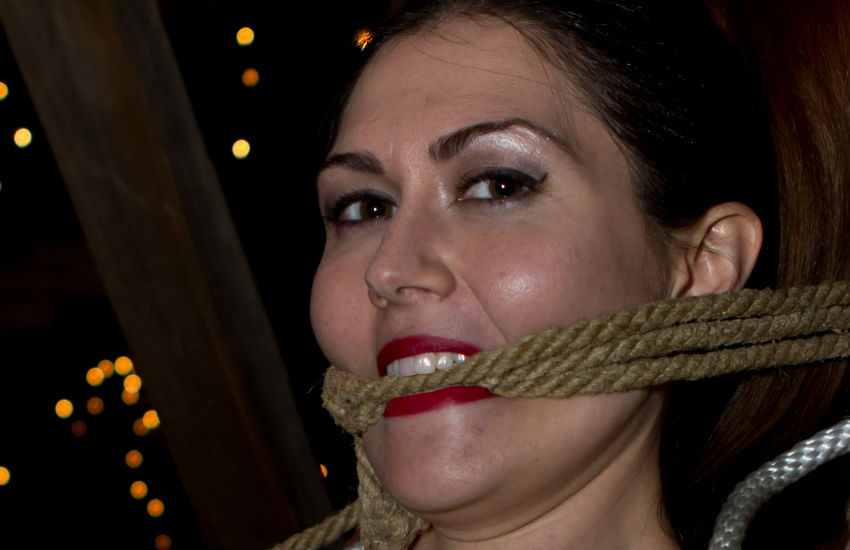‘I tend to play pretty hard,’ Rizzo Barajas from Martinez, California told Gay Star News. ‘Usually involving blood or very hard physical impact play.’
Rizzo identifies as a queer agender person of color.
He’s also a switch, which means he alternates between taking either the submissive or dominant role during Bondage, Discipline, Sadism and Masochism (BDSM) sessions.
But sometimes after a heavy session (also known as a scene) he’ll go from extreme pleasure to an intense drop in his mood.
‘It’s kind of like extreme temperature changes,’ he said. ‘Running from the pool to the hot tub and then back to the pool.’
He continued: ‘It’s jarring for me to go from having the hell beaten out of me to sitting and having a cup of water while trying to socialize.’
Photo: Joe Abbruscato / Flickr
Marilyn Hollinger from Millbrae, California describes herself as a ‘sadist, mistress, femme top who likes to play very hard’. She’s been in the leather scene since 1986 and identifies as a lesbian.
She described a ‘drop’ as a bit like a skydive.
Marilyn said: ‘In a usual scene, I find I experience euphoria and it’s almost like an altered state – it can feel like a drug sometimes where you’re just in such a state of pleasure and extreme emotional or physical feelings.
‘So when you’re in this high state, at some point, you come down. You come down into this normal state but sometimes you dip and that’s called a drop,’ she said.
What is a ‘drop’?
Susan Wright from Phoenix, Arizona is the founder and spokesperson for the National Coalition for Sexual Freedom.
She said: ‘A drop is a feeling of depression or bodily decline.’ Susan said it’s a drop from the intense emotional, physical and mental feelings you had during the scene.
Dr Brad Sagarin is the Head of the Science of BDSM Research Team at Northern Illinois University.
Their research examines the positive physiological and psychological effects of consensual BDSM activities.
Sagarin explained: ‘Both bottoms and tops show increases in relationship closeness and reductions in psychological stress from before to after their scenes.’
Bottoms show increases in cortisol (a hormone associated with physiological stress) during scenes and tops show a ‘pleasurable altered state associated with optimal experiences.’

Photo: Franco Folini / Flickr
Dr Richard Sprott at the California State University wrote in the 2016 Journal of Positive Sexuality that ‘drops’ can happen to anyone.
They believe there are two different types of drop – immediate after-scene drop and drops that can happen days later.
Both types can leave people in a deep psychological process that leads to feeling ‘lost, ungrounded, disconnected, unsatisfied, depressed, irritable, vulnerable, raw, sad’.
The science behind a drop
Sprott and Randall theorize a ‘drop’ can be a process of grief and bereavement. Grief ‘refers to the emotional and cognitive reactions that a person has when one experiences a loss or separation.’
They also believe drops can be the result of a person losing their identity.
They wrote: ‘One’s self, or a central identity, is changing in some way. And that change involves a loss of the old self – the old identity.’
Susan said drops can range from being very mild to very intense, boiling down to endorphins and adrenaline.
She said: ‘After a scene, my body is trying to deal with flushing those chemicals out of your system and you really feel it.’

Photo: torbakhopper / Flickr
Susan also says a person experiencing a drop might have a little internalized shame.
She said: ‘For some people, the shame of being kinky and having done what you did may be the reason for a drop. We have so much societal disapproval and perhaps what they did conflicts with what their ideas of what a good person does.’
She added: ‘It’s a terrible thing for someone to feel bad about who they are – it’s why community is so important.’
Marilyn agreed: ‘Sometimes the bottom might think: “Oh well how can I be a good person if I like being hit?” or humiliated, or whatever it is we’re doing.
‘How can I be a good person and person of value? That all hits you in a drop,’ she said.

Photo: istolethetv / Flickr
Another part of feeling a drop might be a physical reaction.
During an intense scene, you might be putting your body through strenuous positions.
If you strain your muscles too hard, you might get a build up of lactic acid. This, in turn, can lead to you feeling sore.
How to prevent a drop
The best way to prevent a drop is open and honest communication with any scene partner you might have.
An important way to do this is to negotiate with your partner beforehand about what you might need after the scene.
This could be as simple as a back rub, a cuddle or sharing a meal together.
Another great way to prevent a drop is to take things slow.
Susan explained: ‘One of the ways to prevent a drop is to have a more gradual build-up in the scene and then a more gradual drop off.
‘For example, if you wanted to do a caning scene, you start with the spanking, you warm up with a good 15 minutes of spanking and tapping lightly with the cane. Then you might administer a stroke of the cane.
‘Then you do your caning for however long you want and then you taper off. You stroke the rest of the body as a decline or you cuddle a lot afterwards,’ she said.

Photo: torbakhopper / Flickr
Rizzo agreed: ‘I like to do a cool down period where the impact is not as hard but is still present. It’s a slow change instead of a hard stop.’
Vigorous stretching beforehand and taking vitamin B is also a good way to deal with lactic acid build up.
Susan also said it helps not to do drugs or drink alcohol before or during a scene.
After care: Dealing with a drop
Every good BDSM-lover knows to have good after care when your scene is done.
After care is giving your body or mind what it needs in order to alleviate or stop a drop from happening.
Marilyn is a mistress and is currently in several master/slave relationships, where she’s the authority.
Even though she’s a top, she says she still experiences a drop in ‘virtually every level of play scene’ she does.
She explained she can be doing some very intense scene work, involving inflicting high levels of pain. But this is the complete opposite to how she is in the real world.
So a form of after care for her is scheduling a check-in with her partner after the scene is done.
She said: ‘Even though I’m the top, I need reassurance that I’m not evil. So that’s the reason I personally need a check in.’

Photo: torbakhopper / Flickr
Rizzo agreed and said he likes to follow up with subs he plays with in the days after, via text or phone calls. He always wants to make sure they’re OK physically and mentally, and if there is anything he can do for them.
He joked: ‘Remember – if you break it, you buy it. So don’t break it!’
Susan said a great way to deal with a drop is to have some chocolate.
She explained: ‘It helps mirror the oxytocin. So it can really help. Often, at parties, they can have little tables of sweets and chocolates.’
Marilyn said: ‘If I’m doing a scene on a Sunday for example, on Tuesday I’m going to time it so I’m not doing anything emotional because I know I’m going to be in a little bit of a funk.
‘That might be the time that I go do a massage,’ she said.







